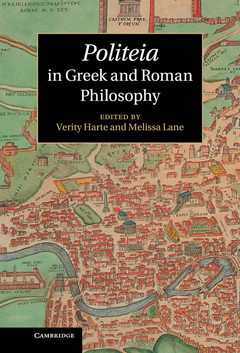Description
Politeia in Greek and Roman Philosophy
Coordinators: Harte Verity, Lane Melissa
This book explores how politeia (constitution) structures both political and extra-political relations throughout the entire range of Greek and Roman thought.
Language: English
Subject for Politeia in Greek and Roman Philosophy:
Publication date: 08-2013
Support: Print on demand
Support: Print on demand
Description
/li>Contents
/li>Biography
/li>
This is the first exploration of how ideas of politeia (constitution) structure both political and extra-political relations throughout the entirety of Greek and Roman philosophy, ranging from Presocratic to classical, Hellenistic, and Neoplatonic thought. A highly distinguished international team of scholars investigate topics such as the Athenian, Spartan and Platonic visions of politeia, the reshaping of Greek and Latin vocabularies of politics, the practice of politics in Plato and Proclus, the politics of value in Plato, Aristotle and the Stoics, and the extension of constitutional order to discussions of animals, gods and the cosmos. The volume is dedicated to Professor Malcolm Schofield, one of the world's leading scholars of ancient philosophy.
Introduction Verity Harte and Melissa Lane; Part I. The Vocabulary of Politics: 1. The political art in Plato's Republic Alexander Long; 2. Putting history in its place: Plato, Thucydides, and the Athenian politeia Cynthia Farrar; 3. Platonizing the Spartan politeia in Plutarch's Lycurgus Melissa Lane; 4. The body politic: Aëtius on Alcmaeon on isonomia and monarchia Jaap Mansfeld; 5. Latin philosophy and Roman law Miriam Griffin; Part II. The Practice of Politics: 6. The Platonic manufacture of ideology, or how to assemble awkward truth and wholesome falsehood Robert Wardy; 7. Plato's politics of ignorance Verity Harte; 8. The political skill of Protagoras Nicholas Denyer; 9. Proclus and politics Jonathan Barnes; Part III. The Politics of Value: 10. Relativism in Plato's Protagoras Catherine Rowett; 11. Justice writ large and small in Republic IV Myles Burnyeat; 12. An aesthetic reading of Aristotle's Ethics Richard Kraut; 13. The Stoic sage in the original position Mary Margaret McCabe; Part IV. Politics Extended: Animals, Gods, Cosmology: 14. Aristotle on the natural sociability, skills and intelligence of animals Geoffrey Lloyd; 15. Gods and men in Xenophanes James Warren; 16. Socrates and his gods: from the Euthyphro to the Eudemian Ethics Christopher Rowe; 17. The atheist underground David Sedley; Malcolm Schofield bibliography, 1970–2012.
Verity Harte is Professor of Philosophy and Classics at Yale University, where she teaches ancient philosophy. She is the author of Plato on Parts and Wholes: The Metaphysics of Structure (2002) and co-editor of Aristotle and the Stoics Reading Plato (2010), as well as various articles in ancient philosophy. From 2003 to 2011, she was the Managing Editor of leading ancient philosophy journal, Phronesis.
Melissa Lane is Professor of Politics at Princeton University, where she teaches political theory with a specialization in the thought of ancient Greece. She is the author of Eco-Republic (2011 and 2012), Plato's Progeny (2001) and Method and Politics in Plato's Statesman (1998); an associate editor of The Cambridge History of Greek and Roman Political Thought, edited by Christopher Rowe and Malcolm Schofield (2000); and co-editor of A Poet's Reich (2011).
Melissa Lane is Professor of Politics at Princeton University, where she teaches political theory with a specialization in the thought of ancient Greece. She is the author of Eco-Republic (2011 and 2012), Plato's Progeny (2001) and Method and Politics in Plato's Statesman (1998); an associate editor of The Cambridge History of Greek and Roman Political Thought, edited by Christopher Rowe and Malcolm Schofield (2000); and co-editor of A Poet's Reich (2011).
© 2024 LAVOISIER S.A.S.




